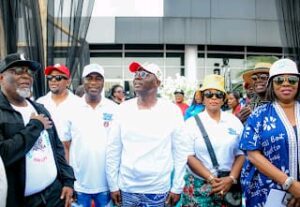SERAP drags NNPC Ltd to court over failure to account for Nigeria’s daily oil output, revenues
The Socio-Economic Rights and Accountability Project (SERAP) has filed a lawsuit against the Nigerian National Petroleum Company Limited (NNPC Ltd) over the “failure to disclose details of Nigeria’s daily oil production, exportation and the total amounts of revenues generated from oil since the removal of subsidy on petrol in May 2023.”
The suit, with number FHC/ABJ/CS/1719/2023, was filed by SERAP on Friday at the Federal High Court in Abuja.
The advocacy group had earlier urged Mele Kyari, NNPC Ltd chairman, to disclose how much of the revenues generated from oil have been remitted to the public treasury since the removal of subsidy on petrol.
This disclosure was contained in a letter dated December 9, 2023 and signed by SERAP Deputy Director, Kolawole Oluwadare, where the organisation noted that there is a legitimate public interest in disclosing the information sought.
In the letter, SERAP gave NNPC Ltd a seven-day deadline to respond and provide an audit to the public on the amount of oil produced daily as well as the revenue generated from oil proceeds since the removal of the subsidy.
Following their failure to respond to the letter, the group filed a lawsuit, claiming that the action was in the public interest.
The suit, filed on behalf of SERAP by its lawyers, Kolawole Oluwadare and Andrew Nwankwo, read in part:
“Nigeria’s daily oil production, exportation and the revenues generated have been mostly shrouded in secrecy.
“Disclosing the amounts of barrels of oil the country produces and exports daily, the revenues generated and remitted to the public treasury would also ensure that the NNPC operates within the law.
“Transparency and accountability in the amounts of barrels of oil the country produces and exports daily, the revenues generated and remitted to the public treasury would improve the enjoyment by Nigerians of their right to natural wealth and resources.
“The public interest in publishing the information sought outweighs any considerations to withhold the information.
“Despite the country’s enormous oil wealth, ordinary Nigerians have derived very little benefit from oil money primarily because of widespread grand corruption, and the culture of impunity of perpetrators.
“Combating the corruption epidemic in the oil sector would alleviate poverty, improve access of Nigerians to basic public goods and services, and enhance the ability of the government to meet its human rights and anti-corruption obligations.
“Section 15(5) of the Nigerian Constitution 1999 (as amended) requires public institutions and officials to abolish all corrupt practices and abuse of power.
Section 16(2) of the Nigerian Constitution further provides that, ‘the material resources of the nation are harnessed and distributed to serve the common good.’
“Section 13 of the Nigerian Constitution 1999 imposes clear responsibility on the NNPCL to conform to, observe and apply the provisions of Chapter 2 of the constitution.
“Nigeria has made legally binding commitments under the UN Convention against Corruption and the African Union Convention on Preventing and Combating Corruption to ensure transparency and accountability in the management of public resources.
“Articles 5 and 9 of the UN Convention against Corruption also impose legal obligations on the NNPCL to ensure proper management of public affairs and public funds. These commitments ought to be fully upheld and respected.
“The NNPC Ltd has failed to disclose the amounts of barrels of oil the country produces and exports. The NNPCL has also reportedly failed to publish details of revenues generated from the production and exportation of oil and the amounts of revenues remitted to the public treasury as required by Nigerian laws.”




